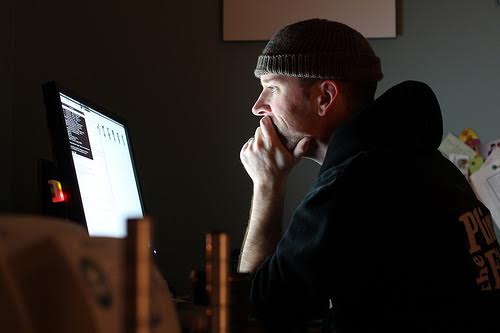What the boss says, goes. Don’t put anything online that you wouldn’t print out and hang over your desk. Don’t expect a free lunch, or a fast promotion, and always remember: your mama doesn’t work here.
Those are the old rules of corporate culture, and most of us – especially if we were born before ubiquitous internet – agree that they’re still the smart way to go. After all, what is etiquette, but a way to keep from driving our neighbors crazy, whether those neighbors live across a driveway or on the other side of a cubicle wall?

(Photo Credit: Gratisography)
Maybe the demise of those cubicle walls is partly to blame. It’s hard to read Ben Widdicombe’s New York Times piece, What Happens When Millennials Run the Workplace?, and not see a certain openness gone wrong in the anything-goes workplace he describes.
Widdicombe spent time at the offices of Mic, a millennial-focused and millennial-run news site. What he encountered there is not necessarily presented as a microcosm of all millennial-occupied workplaces, or of the changing workforce in general – but it is pretty mind-boggling for anyone who came up through the ranks during a time when the cool CEOs still had to assure you that it was OK to call them by their first name.
Take, for instance, the employee who took a week off for an entirely fictitious wake, and then posted on Medium about his treehouse-building adventure – and got off with a warning. Or, the employee who demanded an apology from the CEO in front of a group of people. (That person was later let go for “performance-related issues.”)
For the baby boomers back in the day, anyone older than 30 couldn’t be trusted. For non-millennials these days, anyone under 30 appears to occupy another planet altogether – at least, if you go by reputation and anecdotes.
But, Are Millennials So Different From Gen Xers – or Even Boomers?
To start with, it’s dangerous to take stories like these and make sweeping assumptions about an entire generation. We can’t and shouldn’t extrapolate generational values from one profile of a single corporate culture, or even a handful of stories that seem to follow a theme. Human beings are pattern seekers; we see faces in electrical outlets and patterns where none exist. To figure out who the millennials are in general, we’re better off looking at the data.
And the data tell us a very different story than we might put together from reading the news. The stereotype of millennials is that they’re entitled, apt to quit their jobs in a hurry, spoiled by helicopter parents to the extent that they can’t risk failure or solve their own problems, and out for themselves instead of the team. If the words “participation trophy” cause you to cringe, you probably have strong opinions about millennials and their supposed approach to life and work.
It’s hard to prove or disprove entitlement, but we can knock out a few of the other assumptions. Take, for example, the myth of job-hopping millennial, which Ben Casselman so effectively destroyed over at FiveThirtyEight:
“The myth of the job-hopping millennial is just that — a myth,” he writes. “The data consistently shows that today’s young people are actually less professionally itinerant than previous generations. In fact, millennials — and the U.S. economy as a whole — would be better off if they’d live up to the stereotype and start switching jobs more often.”
Then there’s the fact that millennials have higher unemployment rates than any other age demographic. Take a look at the Bureau of Labor Statistic’s numbers for the past year. In February 2016, for example, workers aged 25 to 34 years had an unemployment rate of 5.1 percent, compared to a rate of 3.8 percent for those aged 35 to 44 (and similar or better rates for workers aged 45-plus). Workers in their early 20s had a whopping 8.6 percent unemployment rate.
These are not people who are in a position to make demands, and they seem to know it – hence the lack of voluntary job-hopping.
To Change the World, You Need Influence
Get rid of the job-hopping, spoiled-for-choice millennial and what do you have left of the stereotype? Just someone who doesn’t know how to gauge social situations at work, and who’s given to complaining that life isn’t fair – in other words, a young person, of any generation. We were there, too, my fellow old folks.
Finally, let’s get back to our original question: are millennials changing work? As the most unemployed generation, it’s unlikely that they have that kind of pull. It seems more likely that a combination of a down economy and better technology are responsible for the insecurity and freedom of the modern workplace. You can work from home, now, or ride a hoverboard around the office – but you might not have a job next month.
Stories like these are satisfying to read, and good for a reminder about what not to do at work. But the behavior of a few young workers who are lucky enough to score a job at Micdoesn’t reflect the attitudes and values of an entire generation of workers any more than Hannah Horvath’s voice speaks for an entire generation. We’re not looking at “millennial behavior”; we’re looking at the behavior of a few millennials.
[SOURCE :-payscale]

